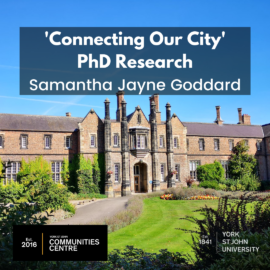David Sanmartino, a student at York St John University, introduces himself and thier exciting new PhD research undertaking!
As the mental health field is moving towards person-centred care, capturing the voices, preferences and perspectives of clients is crucial. Professional services in clinical practice and some non-clinical approaches to counselling and psychotherapy use Routine Outcome Measures (ROMs) and for different purposes.
ROMs can be used in multiple ways, from collecting data, supporting evidence-based treatments, informing policies, benefiting some approaches upon others to enhancing the therapeutic relationship, evaluating goals and treatments, opening meaningful conversations between therapists and clients, and many more. However, like many things in life, using ROMs in counselling and psychotherapy brings controversy, many questions, and new horizons to explore.

Although the use of ROMs in counselling and psychotherapy is not new, the use of ideographic measures to explore domains of therapy that can be meaningful for clients is still in its early days. Ideographic measures focused on the individual and unique experience of clients exploring domains that are relevant to them therefore can be relevant to inform practice and policies in the mental health field. On the other hand, nomothetic measures are standardized questionnaires that measure patients self-reported experiences in universal indicators. Both types of measures come with advantages and limitations so having client’s opinion and perspective about their experiences using them is a must.
I work under the lenses of Pluralism and Metamodernism in which there is not a single truth or reality, but many ways of doing and being that are equally valid. Pluralism focuses on respecting and promoting the uniqueness of human beings, which makes us richer collectively. It is based on collaboration and metacommunication and encourages the use of knowledge individuals’ possess about the world, themselves and their cultural resources. When it comes to therapy, Pluralism puts clients at the centre of everything working towards their goals and preferences.
From a Pluralistic perspective, I would like this PhD to contribute to exploring how helpful and meaningful ideographic measures can be for clients and therapists. Additionally, the project will explore how ideographic measures can help to inform counselling and psychotherapy practice, putting the client’s voice at the centre.
In this first face of the PhD, I am reading literature and “playing around” creatively with different concepts, identifying gaps in the literature and understanding different dimensions of using ROMs in the mental health field.
As a great addition to my PhD, I am starting a fellow teaching position with Abertay University in Scotland. Also, I continue practising counselling with very few clients in private practice. Both activities perfectly complement my doctoral program, and I am dedicating to them one day and a half of the week to ensure that they are adding and not interfering with my PhD.
I am genuinely grateful to York St John University for this PhD position as I feel valued and supported as an individual within a thriving and vibrant community.
~
Author: David Sanmartino
~


